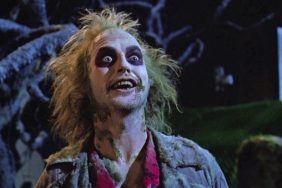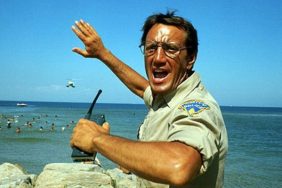For the third year in a row, the middle of January brings with it an ambitious film about modern warfare, based on a true story no less. Lone Survivor was a hit in 2014, American Sniper was a HUGE hit in 2015, and now in 2016 we have Michael Bay’s 13 Hours: The Secret Soldiers of Benghazi, a film that will probably make truckloads of money as well. At least, that’s what the studio is counting on.
But are any of these films the best movie ever made about modern warfare? Apparently not, according to our panel of film critics. This week on The Best Movie Ever we asked William Bibbiani and Witney Seibold of Crave, and Brian Formo of Collider, to present which film they could pick to represent the greatest dramatic depiction of our contemporary armed conflicts. They can only pick one film each, and as usual it ain’t easy, and as usual they can’t agree on a thing.
Find out which films made the top of their lists and why, and come back next Wednesday for an all-new topic on an all-new, highly debatable installment of Crave’s The Best Movie Ever!
Brian Formo’s Pick: Three Kings (1999)

Warner Bros.
War has changed; as such, war movies—set post-Vietnam—have also changed. If troops are on the ground, it’s substantially less than ever before. Soldiers aren’t charging out of boats, diving into dugouts or foxholes, but dodging mines and attempting to locate their enemy with night vision goggles. There’s been a masterpiece about modern warfare, it was made by Kathryn Bigelow and it’s called Zero Dark Thirty. It’s a taut, cat and mouse tactical search for the most wanted leader of a terrorist cell, Osama bin Laden. And it looks unlike any other war movie we’ve ever seen.
As much as my brain wants me to pick Zero Dark Thirty, I’ll listen to my internal organs and choose David O. Russell’s action satire, Three Kings. Firstly, I can’t shake the brilliant opening of with Mark Wahlberg, Ice Cube and Spike Jonze out on patrol during the first Iraq War, spotting a man in the distance who might be waving a white flag or might have a weapon, Wahlberg stops and shouts a question over his shoulder, “Are we shootin’ people or what?”
The main reason why I’m choosing Russell’s satire is because it’s one of the first films that crossed war action tropes with questions about what modern warfare is, what soldiers are allowed to do, who the enemy actually is, etc. It lands on “War is Hell” not just because of the barrage of bullets, but because everything is a gray area, objectives aren’t clear and villagers are too often put in crosshairs. But another reason I’m choosing Kings because it’s a rare action movie that makes every bullet count, even having cameras enter the bodies of our Kings to show us the damage it causes internally. Lastly, Three Kings is a rare film that makes the audience see things from the “enemy’s side”, even while they torture a captured US soldier; Three Kings has a lot of gall… and it shows.
William Bibbiani’s Pick: Black Hawk Down (2001)

Columbia Pictures
War movies are dangerous, in more ways than one. The very act of filming warfare on a grand scale has the potential consequence, intended or otherwise, of elevating war itself to greatness in the subconscious of the viewer. But even making a so-called “anti-war” movie has its drawbacks. Saccharine speeches about peace overcoming all odds ring distinctly untrue when all we see on the news is violence and horror on an international scale.
There have been many great movies about the soldiers involved in our many modern wars. Brian already vaunted Zero Dark Thirty and Three Kings, exceptional films indeed. Ed Zwick’s impressive Desert Storm detective story Courage Under Fire deserves a mention here as well. But if I must pick a film about modern warfare, and if I’m not allowed to pick the incredible HBO mini-series Generation Kill (which is so damn near perfect it makes The Hurt Locker look like crap in comparison), I am forced to pick a film that is neither pro-war nor anti-war. Black Hawk Down is simply “war.”
Ridley Scott’s film, about the cataclysmic Battle of Mogadishu isn’t overly concerned with politics, and it only occasionally brushes itself up against philosophy. Black Hawk Down instead focuses on the intense experience of being deep inside a firefight. Scott films the chaos in all of its strange horror, and then Pietro Scalia masterfully edits it all together so that the audience is never confused, just awestruck. Such violence, such sound, such fury. Never before (and so far, never again) has warfare so consistently, hellishly wrapped around us. It may not be a great “story,” but by god is it great filmmaking. It’s the best modern warfare movie we’ve got.
Witney Seibold’s Pick: The Hurt Locker (2008)

Summit Entertainment
When it comes to tales of ancient wars – or even of wars around 50-years-old – there is a grand patriotic romance. The popular perception of World War II, for instance, is that it was morally clean-cut, and that the winners were on the side of righteousness, while the losers – the Nazis – were unmitigated villains who needed to be stopped. Films about that war tend to reflect that easy-peasy dualism. Once you move into the Vietnam war, however, things become a little more sticky. Movies about that war tend to be about confusion and trauma. Fast-forward to films about modern wars (i.e. anything since Operation Desert Storm), and they tend to be about the way the government manipulates soldiers, and how the soldiers feel increasingly disconnected from the reasons why the war began. In modern warfare, it’s all about the extremity of the situation, and patriotism be damned.
The best film to deal with the modern military milieu is Kathryn Bigelow’s 2009 Best Picture winner The Hurt Locker. This is a film that deals – on a very visceral level – with the strangely addictive extremity of a soldier’s life. We often see soldiers return from the war changed, mentally wounded in some way, unable to engage with the normal world. They’ve seen too much. The Hurt Locker shows us the “too much,” and lets us experience both the highs and lows of everything that implies.
But the real emotional crux of The Hurt Locker comes at the end when our main character (Jeremy Renner) has returned from combat, and is trying to get back into the swing of run-of-the-mill domesticity. He’s not a hollowed man, but this life seems so far removed from, well, life. In a grocery store, his wife sends him to fetch cereal. He walks into the cereal aisle, and sees the hundreds of varieties. He is stymied. He sees nothing but a blank, meaningless American excess. His decisions used to be about life and death. Now they’re about hundreds of cereals. This is a very real, very moving moment that encapsulates modern warfare and its disconnect from this country in ways rarely seen.
Previously on The Best Movie Ever:
Top Photo: Warner Bros./Columbia Pictures/Summit Entertainment
The Best Movie Ever
-
The Best Movie Ever | Under the Sea

Is the best movie ever set underwater a family film about a fish or a World War II movie about a German submarine?
Photos: Disney / Pixar / Neue Constantin Film
-
The Best Movie Ever | Video Game Adaptations

There aren't a lot of good video game adaptations, and our critics just can't agree on which one is the best.
Photos: Universal Pictures / New Line Cinema / Dimension Films
-
The Best Movie Ever | Reptiles

Movies about slithery things aren't very common, so our critics are presenting their picks for the best reptile movies ever.
Photo: Warner Bros. / Paramount Pictures / New Line Cinema
-
The Best Movie Ever | Helena Bonham Carter

Is Helena Bonham Carter's best movie a classy costume drama or a twisted critique of contemporary masculinity?
Photo: Fine Line Features / Miramax Films / 20th Century Fox
-
The Best Movie Ever | Crime Comedies

What's the best comedy ever made about living a life of crime? Our critics present their picks.
Photo: MGM / Warner Bros. / Janus Films
-
The Best Movie Ever | Jodie Foster

The Oscar-winning actor/director is one of the most respected artists in the film industry. But what's her best movie ever?
Photo: Columbia Pictures / Warner Bros. / MGM Home Entertainment
-
The Best Movie Ever | Robert Downey Jr.

The man who would be Iron Man has had one of the most unusual careers in film history, but which movie is his best?
Photo: Warner Bros. Pictures / Paramount Pictures
-
The Best Movie Ever | Cats

Keanu may be a great comedy about a cat, but what's the best cat movie ever? Our critics picked some WEIRD films this week!
Photo: Drafthouse Films / United Artists / Kindai Eiga Kyokai
-
The Best Movie Ever | Charlize Theron

Is Charlize Theron's best movie the one that earned her an Oscar, or the one that kicked ass?
Photo: Warner Bros. / Newmarket Films
-
The Best Movie Ever | Ice Cube

It's been 25 years since Ice Cube made his acting debut. So what's his best movie ever?
Photo: Miramax Films / New Line Cinema / Universal Pictures
-
The Best Movie Ever | Dreams

What's the best movie ever made about dreams, dreaming or dreaminess? Our critics present their picks.
Photo: Films du Losange / Criterion / Fox Searchlight
-
The Best Movie Ever | Batman

Everybody loves Batman, but what's the best Batman movie ever? Our critics can't agree in this week's roundup.
Photo: 20th Century Fox / Warner Bros.
-
The Best Movie Ever | Superman

Batman v Superman isn't the best Superman movie ever, so we asked our stable of critics to decide which one is.
Photo: Warner Bros.
-
The Best Movie Ever | Justice

Let's celebrate this exciting new Dawn of Justice with a spirited debate about the best movie ever made about justice itself.
Photo: Koch-Lorber / 20th Century Fox / United Artists
-
The Best Movie Ever | John Goodman

The star of 10 Cloverfield Lane has had an astounding career, but what's his best movie ever?
Photo: Gramercy Pictures / 20th Century Fox
-
The Best Movie Ever | Die Hard Ripoffs

Die Hard spawned a whole genre of action movies that live on to this day, but which Die Hard ripoff is the best?
Photo: 20th Century Fox / Columbia Pictures / Golden Princess Film Production
-
The Best Movie Ever | Oscar Bait

'Oscar bait' isn't an insult, it's a genre. So what's the best Oscar bait movie ever?
Photo: The Weinstein Company / Universal Pictures
-
The Best Movie Ever | Witchcraft

What's the most bewitching movie ever made about witches? Our panel of critics narrows it down to two classic films.
Photo: Criterion / American International
-
The Best Movie Ever | Action Comedies

If Deadpool isn't the best action comedy ever, what is? Our panel of film critics make the case for their favorites.
Top Photo: Warner Bros. / RM Films International / 20th Century Fox
-
The Best Movie Ever | George Clooney

Everyone loves George Clooney, but none of our critics can agree on which film qualifies as his very best.
Photo: Buena Vista / Universal / Warner Bros.
-
The Best Movie Ever | Martial Arts

Our panel of critics fights over their picks for the best martial arts movie ever made. There can be only one!
Top Photo: Shaw Bros. / Warner Bros. / Toho
-
The Best Movie Ever | Creepy Dolls

Everyone's frightened of little toy people, but what's the creepiest creepy doll movie ever?
Top Photo: Universal Pictures / United Artists / New World Pictures
-
The Best Movie Ever | Modern Warfare

If 13 Hours isn't the best movie about our contemporary wars, what is? Our panel of critics weighs in.
Photo: Warner Bros./Columbia Pictures/Summit Entertainment
-
The Best Movie Ever | Revenge

If The Revenant isn't the greatest revenge movie, what is? Our film critics nominate some of the best films ever made.
Top Photos: Janus Films / Paramount Pictures / Tartan Films
-
The Best Movie Ever | Parties

We asked our critics to pick the best party movie ever made, and none of them picked a film about a frat house.
Photo: Warner Bros. / 20th Century Fox / Sony Pictures Classics
-
The Best Movie Ever | Quentin Tarantino

Is the Hateful Eight director's best film an autumnal romance or a World War II drama? Our critics can't decide.
Photos: The Weinstein Company / Miramax
-
The Best Movie Ever | Star Wars

Is A New Hope better than The Empire Strikes Back? Our critics debate the classics (and ignore the rest).
Photos: Disney / LucasFilm
-
The Best Movie Ever | Ron Howard

He's directed films in nearly every genre and won an Oscar for his troubles, but what's the best Ron Howard movie ever?
Photo: Touchstone / Universal / MGM
-
The Best Movie Ever | William Shakespeare

He's the most adapted author in movie history, but which William Shakespeare movie is the very best?
Photo: Top Photos: Toho / Paramount / Columbia
-
The Best Movie Ever | Pixar

Everyone has their favorite Pixar movie, but which one is the best?
Photo: Disney
-
The Best Movie Ever | Young Adult

Before you say goodbye to The Hunger Games, find out what our critics think was the best young adult movie ever.
Photo: Universal Pictures / Warner Bros.
-
The Best Movie Ever | Angelina Jolie

She's been acting for decades, directing for years, and winning our admiration forever. But what is Angelina Jolie's best film ever?
Photo: The Samuel Goldwyn Company / HBO / Columbia Pictures
-
The Best Movie Ever | James Bond

It's new school versus old school! Our critics debate which film qualifies as the best Bond movie ever.
Photo: MGM / Colombia Pictures / United Artists
-
The Best Movie Ever | Sandra Bullock

Our critics can only agree on one thing: the best Sandra Bullock movie isn't the one that got her an Oscar.
Photo: 20th Century Fox / Warner Bros.






